To achieve good results in bodybuilding, an athlete must competently approach the organization of nutrition and physical activity. Most modern athletes prefer sports nutrition, in particular the intake of amino acids. To choose the right nutritional supplements containing amino acids, you need to know for what purposes they are intended, and how to use them.
There are three types of amino acids: nonessential, conditionally nonessential, and nonessential. Essential amino acids are not produced in the body on their own, so the athlete must add them to his diet.
Aminocarboxylic acids are one of the elements of protein. Their presence is of great importance for the normal functioning of the body, since they are necessary for the production of certain hormones, enzymes and antibodies.
In order for the body to properly replenish energy after training, as well as build muscle, it needs amino acids. Therefore, they are of considerable importance in the nutrition of a bodybuilder.
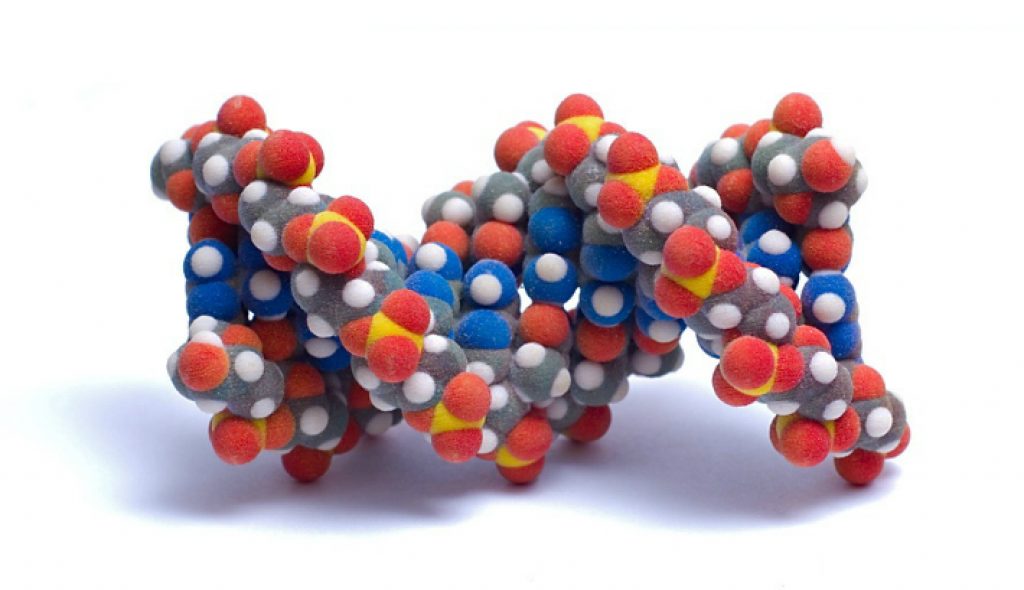
Amino acid is the main building block of all proteins of animal and plant organisms.
The importance of amino acids in bodybuilding
Since amino acids are involved in all body processes associated with physical activity (restoration and activation of muscle tissue growth, suppression of catabolic processes), it is difficult to overestimate their importance for modern athletes. The fact is that physical activity, even of moderate intensity, leads to a significant consumption of free amino acids (up to 80%). And timely replenishment of the shortage contributes to building muscle mass and increasing the effectiveness of training.
Of particular importance for bodybuilders are BCAAs (branched-chain aminocarboxylic acids - valine, isoleucine and leucine), since almost 35% of all muscles consist of them. In addition, BCAAs have powerful anti-catabolic properties and other beneficial functions, which is why many sports nutrition manufacturers make nutritional supplements based on them.
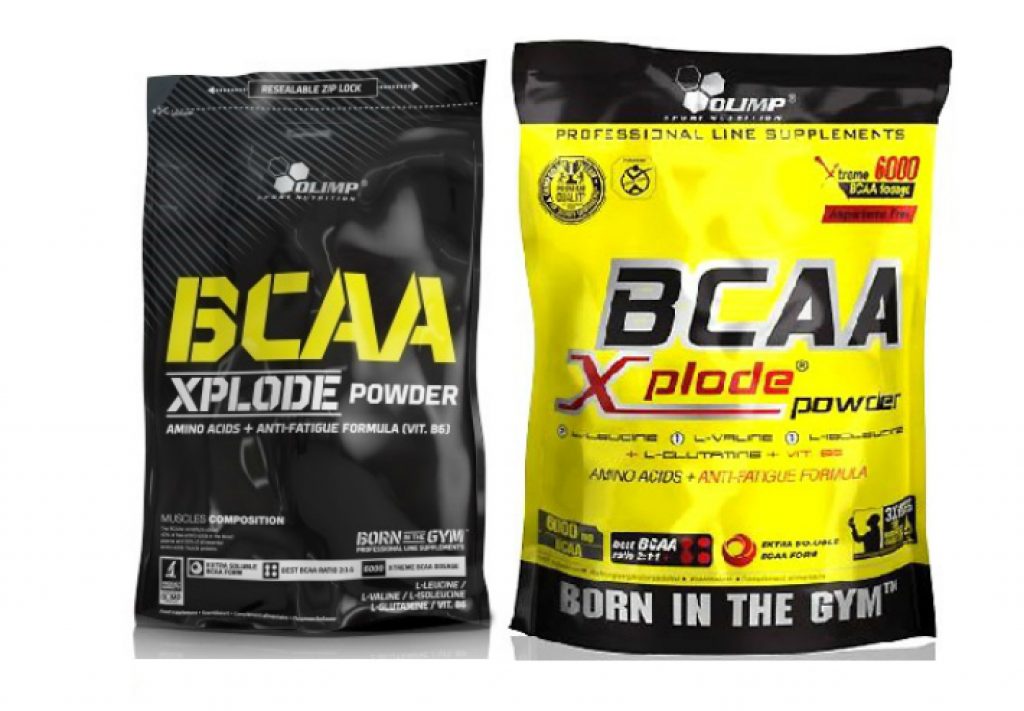
BCAAs are three essential amino acids: leucine, isoleucine and valine, the starting material for building and regenerating body cells.
Amino acid complexes differ in composition, the ratio of amino acids and the degree of hydrolysis. Amino acids in free form, usually isolated, we have already mentioned them, these are glutamine, arginine, glycine, etc., however, there are also complexes. Hydrolysates are broken proteins that contain short amino acid chains that can be quickly absorbed. Di- and tripeptide forms are, in fact, also hydrolysates, only the amino acid chains are shorter, and consist of 2 and 3 amino acids, respectively, and are absorbed very quickly. BCAA is a complex of three amino acids - leucine, isoleucine and valine, which are most in demand in the muscles, and are absorbed very quickly.
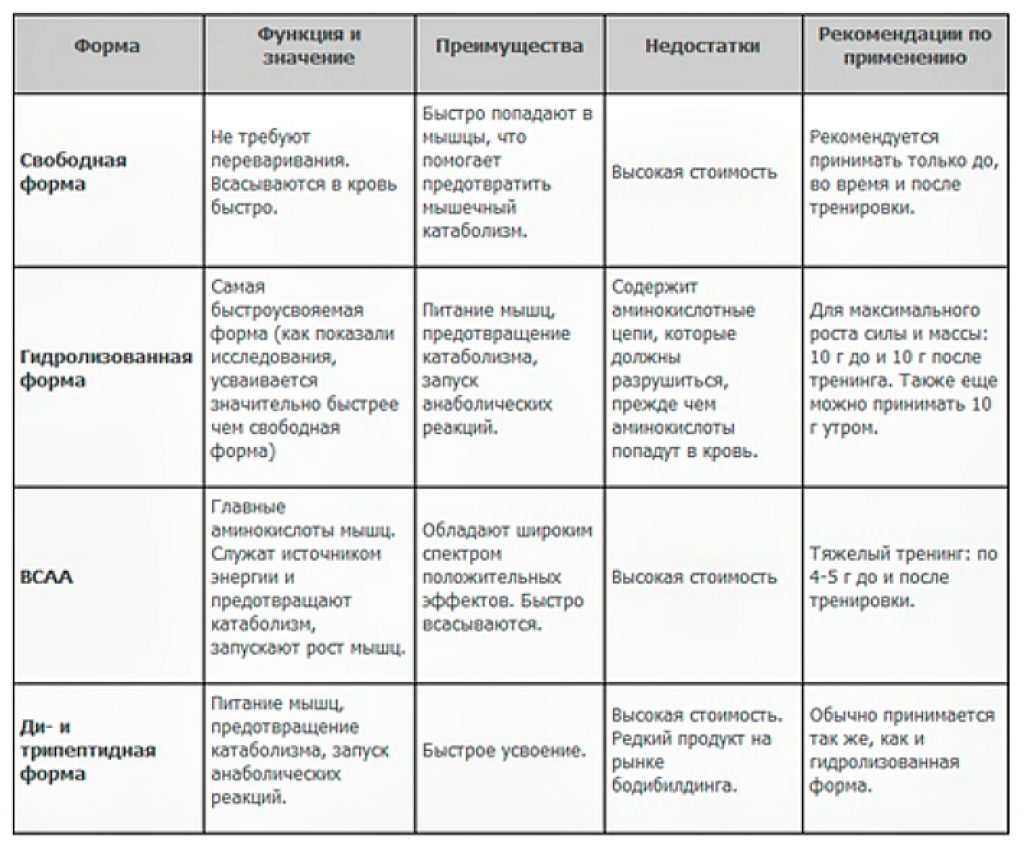
Amino acids are available in the form of powder, tablets, solutions, capsules, but all these forms are equivalent in effectiveness. There are also injectable forms of amino acids that are administered intravenously. It is not recommended to inject amino acids, as it does not have any advantages over oral administration, but there is a high risk of complications and adverse reactions.
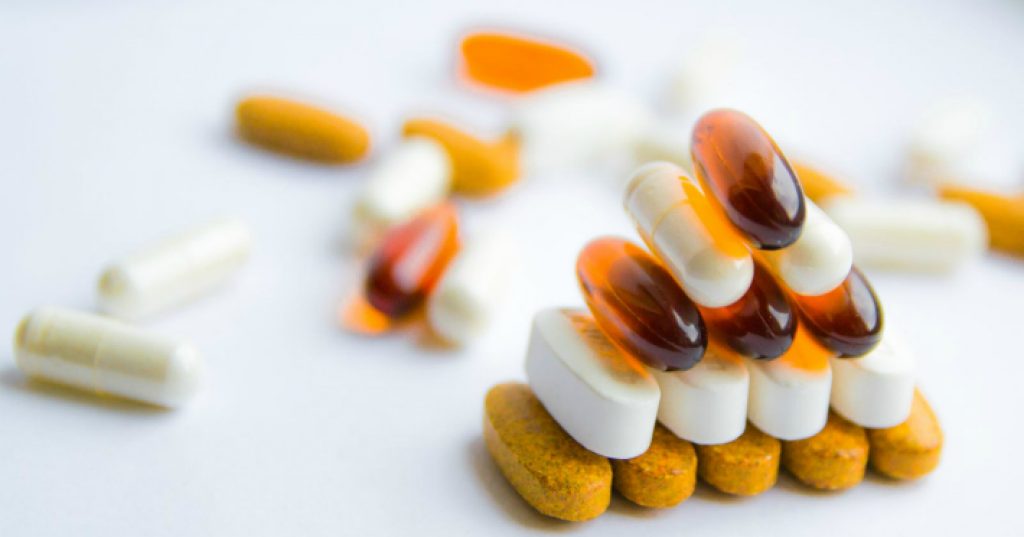
One of the common forms of release of amino acids is tablets and capsules.
Amino acid classification
There is the following classification of aminocarboxylic acids:
- Interchangeable. These amino acid compounds can be synthesized on their own, especially after the intake of enzymes, minerals and vitamins. Non-essential amino acids include: glutamine, arginine, taurine, asparagine, glycine, carnitine and others.
- Partially replaceable (or conditionally irreplaceable). Synthesized in the body in a limited amount, these include tyrosine, alanine, histidine and cysteine.
- Irreplaceable. They are not produced by the body and come only with food and sports supplements, and therefore their deficiency is often observed.
A person receives this type of acids (EAA) only with food. Their lack in the body leads to a deterioration in well-being, metabolic disorders, and a decrease in immunity.
At the same time, it is possible to fill the need for EAA only with the help of a plentiful and balanced diet, which is almost impossible.
That is why many bodybuilders choose to obtain essential amino acids through the regular use of appropriate supplements. To stimulate protein synthesis and muscle tissue growth, it is recommended to take such drugs both before and after training.
![]()
Valine, methionine, tryptophan are part of the drugs, which include essential amino acids.
List of essential amino acids
It includes several EAAs:
- Valin. Takes part in the formation of glycogen and stimulates energy production during a low-calorie diet.
- Isoleucine. Breaks down cholesterol, necessary for the formation of hemoglobin and glycogen, as well as the metabolism of carbohydrates.
- Leucine. Reduces blood sugar levels in diabetes, fills the body with energy, takes part in the metabolism of carbohydrates and activates the breakdown of cholesterol.
- Lysine. When metabolized in combination with methionine and vitamin C, it forms carnitine, which improves the body's resistance to stress and fatigue. It also stimulates mental activity, supports the high performance of the immune system, has a positive effect on calcium absorption and the restoration of connective and bone tissues.
- Methionine. It is a powerful antioxidant, activates the process of regeneration of kidney and liver tissues, has a lipotropic effect, takes part in the formation of creatine, cysteine, adrenaline and choline.
- Threonine. Necessary for the formation of elastin and collagen, tissue growth, isoleucine biosynthesis and activation of the immune system. Promotes the process of energy exchange in muscle cells.
- Tryptophan. Kind of an antidepressant. In combination with vitamin B6 and biotin, it helps to normalize sleep. It also takes part in the formation of serotonin and nicotinic acid, stimulates an increase in the blood level of growth hormone.
- Phenylalanine (CNS stimulant). Required for the production of collagen and neurotransmitters, participates in the formation of triiodothyronine, thyroxine, dopamine, norepinephrine, adrenaline, melanin, insulin. It has a beneficial effect on the functioning of the circulatory system, helps to reduce appetite and improve mood, attention, memory and performance.
Since essential amines cannot be synthesized in the body, they are all required by the body. However, for athletes, the most important are the branched chain amines, also known as BCAAs. This group includes three substances: isoleucine, valine, leucine.
The name of these substances is associated with their molecular structure containing an additional carbohydrate chain. These are unique amines as they are metabolized in muscle tissue while the rest of the amino acid compounds are processed in the liver. It is now quite clear why BCAAs are often referred to as muscle amines.
Among the BCAA group amines, leucine is characterized by the greatest anabolic properties. Today, BCAAs can be bought as a separate supplement, and these substances are also included in a large number of other supplements, say, weight gainers, pre-workout complexes, etc.
BCAA
BCAAs have a wide range of positive effects, which we will now discuss.
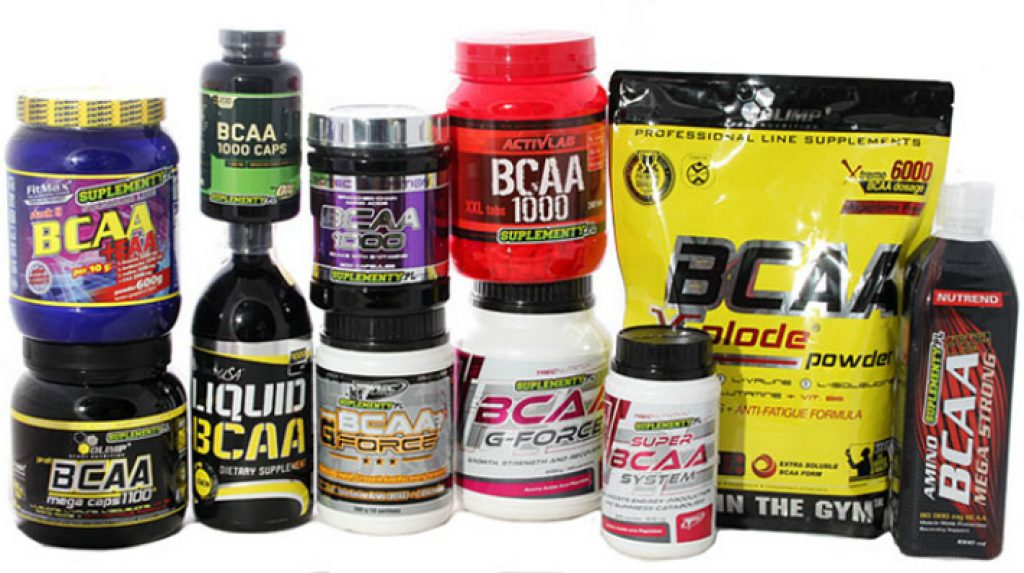
The use of these amino acids stimulates the formation of new muscle tissue, accelerates recovery and slows down the destruction of existing ones, normalizes fat metabolism, accelerates fat burning and improves metabolism.
- Anti-catabolic effect
Amines of the BCAA group are able to effectively protect muscles from destruction. This property of substances is actively used by bodybuilders during cutting, when they have to sit on a low-carbohydrate diet food program.
During training, the body's glycogen reserve is consumed quite quickly and protein compounds that make up muscle tissue begin to be used for energy.
Since the amount of carbohydrates is limited during drying, the energy reserves in the body are small. This can lead to serious weight loss. At the same time, we note that the less fat mass in your body, the higher the likelihood of losing muscle tissue. If used before a BCAA cardio session, this can be avoided.
- Increased effectiveness of training
Many novice athletes are interested in whether BCAAs can increase the effectiveness of training. To answer this question, we present the results of one study. The participants in the experiment were divided into two groups. Representatives of the first took a placebo, and the second used BCAAs. The training process was the same in each of the groups.
As a result, scientists stated that the use of amines decreased the rate of secretion of cortisol and a special enzyme that can destroy muscle tissue - creatine kinase. At the same time, an increase in the concentration of the male hormone was recorded. It should also be said that the subjects with a large fat mass consumed amines in larger quantities in order to manifest the anabolic effect of the supplement.
- Stimulation of the production of anabolic hormonal substances
The group of anabolic hormones should include somatotropin, insulin and testosterone. All of them are able to withstand the destructive effects of cortisol on the body. In the course of numerous studies, it has been proven that BCAAs are able to accelerate the production of all these substances.
This fact also explains the strong anti-catabolic properties of BCAA amines. For example, leucine has the ability to enhance the work of insulin, which leads to an acceleration in the production of protein compounds in muscle tissues. There are also research results that indicate a positive effect of leucine in relation to the processes of reduction of adipose tissue. Also note that the effectiveness of supplements with BCAA amines can be enhanced with vitamin B1.
Glutamine
Glutamine is a conditionally essential amino acid that is found in protein and is essential for effective muscle growth and immune system support. Glutamine is widely distributed in nature and is a conditionally essential amino acid for humans. Glutamine in sufficient quantities circulates in the blood and accumulates in the muscles. Glutamine is the most abundant amino acid in the body, and muscles are made up of 60% of it, which once again emphasizes its importance in bodybuilding.
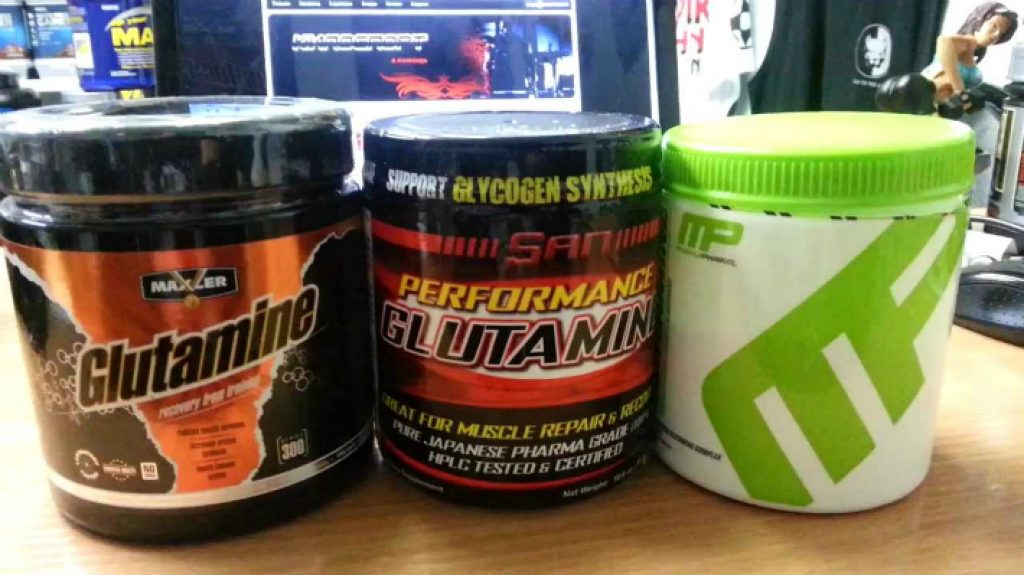
Glutamine is essential for efficient and productive growth of muscle tissue. This amino acid is found in excess in muscle cells and circulates in the blood.
Effects of Glutamine
- Participates in the synthesis of muscle proteins.
- It is a source of energy, along with glucose.
- It has an anti-catabolic effect (suppresses the secretion of cortisol).
- Causes a rise in the level of growth hormone (with the use of 5 g daily, the level of GH increases 4 times).
- Strengthens immunity.
- Accelerates recovery after training, prevents the development of overtraining.
How to take glutamine?
The recommended dose of glutamine is 4-8 g per day. It is optimal to divide this dose into two doses: immediately after training and before going to bed on an empty stomach. After training, glutamine quickly saturates the depleted pool, suppresses catabolism and triggers muscle growth. It is recommended to take glutamine before bed because growth hormone is produced at night, and glutamine can enhance this process. On rest days, take glutamine at lunch and before bed on an empty stomach.
The combination of glutamine with sports nutrition
Glutamine combines well with many sports supplements, and the effects are mutually reinforcing. The most optimal combination: glutamine + creatine, protein. This bundle can include pre-workout complexes, anabolic complexes (testosterone boosters) and other supplements. Do not mix glutamine and protein together as this will slow down the absorption of the former, take them at least 30 minutes apart. Creatine and glutamine can be mixed and taken at the same time.
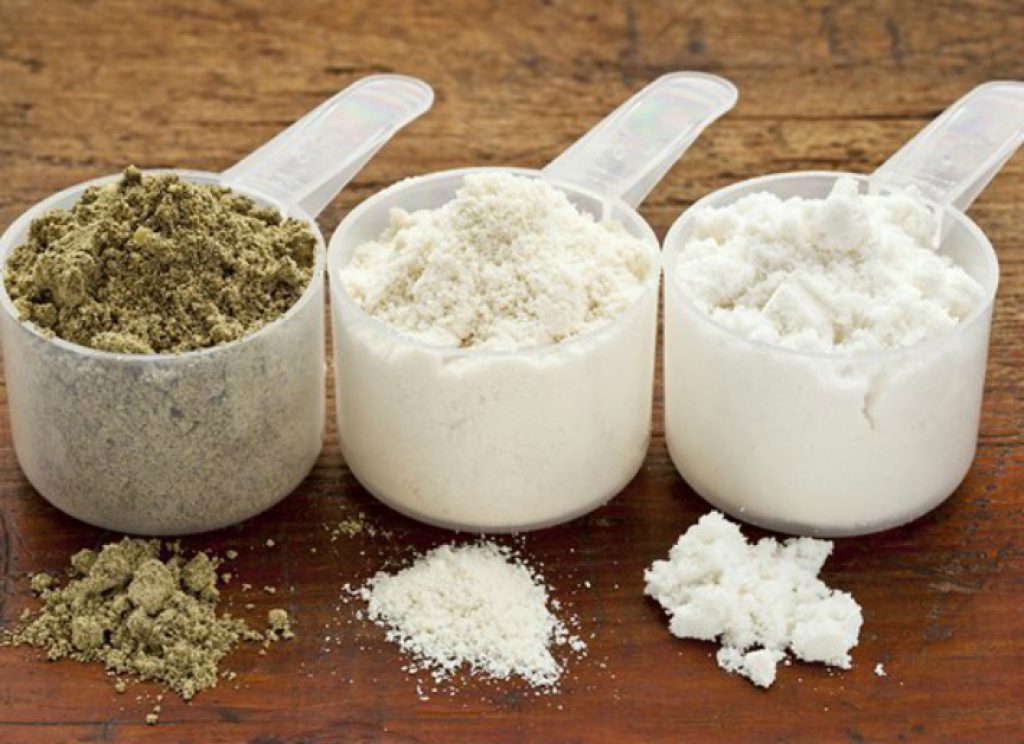
The most optimal pre-workout complex is a combination: glutamine + creatine, protein.
Side effects
Glutamine is a natural amino acid that is constantly supplied with food. Glutamine supplementation is not harmful to health, and usually does not cause any side effects.
Other amino acids common in bodybuilding
- Arginine - improved muscle nutrition, nutrient transport, pumping.
- L-carnitine is one of the best fat burners that is absolutely safe for health.
- Beta-alanine - muscle antioxidant and restorer
- Citrulline is a powerful energy restorer after training, prevents overtraining, and improves muscle nutrition.
Pharmacy amino acids
Modern medicine attaches great importance to drugs based on amino acids. All biochemical systems of the body are made up of these compounds, and this causes the need for their production (you can buy most of the amino acids in a pharmacy).
The main purpose of amino acids is the synthesis of enzymes, which are natural accelerators of all chemical reactions in the body. The better and more efficiently the processes of protein synthesis occur, the more energy is released in humans.
It is estimated that the action of amino acids in the bodies of athletes provides about 10% of their total energy. If the muscles have exhausted their energy reserves during training, then a significant amount of amino acids must be consumed to restore physical performance and progress.
Some of the amino acids are able to influence the production of growth hormones, which makes them useful for athletes involved in strength sports. This fact was proven during the experiment: after taking L-arginine and L-ornithine, the subjects experienced a short-term, but quite significant natural increase in the level of growth hormone.
For twenty-two participants in the experiment, a strength program was written, the duration of which was five weeks. One group was given a certain amount of L-arginine in their diet, while the other group took a placebo (a substance with weak chemical and anabolic activity). After the end of the course of classes, measurements were taken of the strength and muscle gains of all trainees. The results showed that athletes who took amino acids had much more significant achievements.
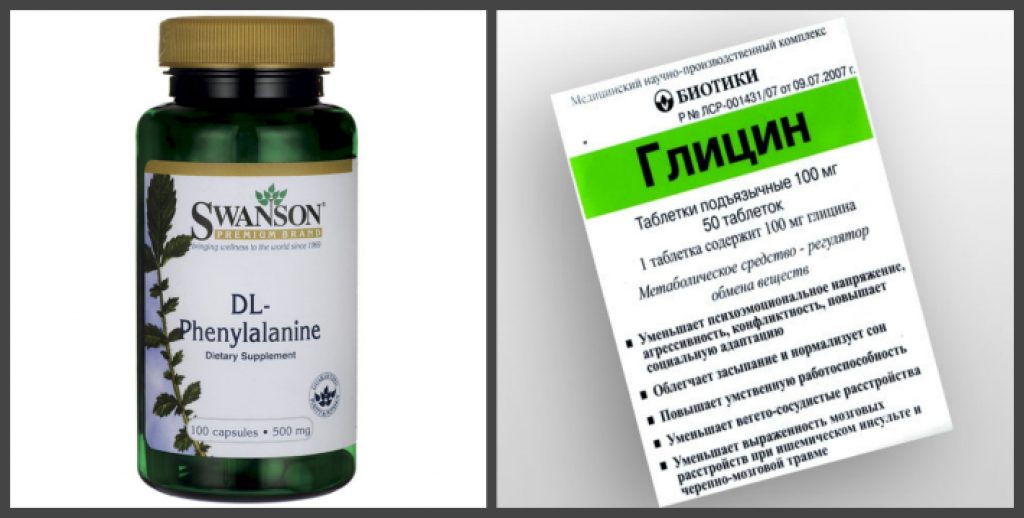
Phenylalanine, glycine are amino acids presented in the form of drugs that can be purchased at any pharmacy.
Phenylalanine
One of the most valuable amino acids for the body is phenylalanine. It has an important effect on the body. One of its functions is to protect endorphins. These cells control pain in the body, and the presence of D- and L-phenylalanine helps to relieve acute pain in the long term. This amino acid is produced naturally in the body and is a thousand times more effective than morphine. Taking a small amount of phenylalanine has a good analgesic effect.
Glycine
An equally valuable amino acid from a pharmacy is Glycine, an amino acid that does not have optical isomers, which is part of many proteins and various biological compounds. It is recommended to use it for diseases of the central nervous system, prolonged stress, insomnia, increased excitability, heavy physical exertion, ischemic stroke. It is recommended to use 0.3 g per day for a month. If necessary, the course can be repeated.
The action of glycine
- The mood improves.
- Decreases aggressiveness.
- Sleep is normalized.
- Increases mental performance.
- The nervous system receives additional protection from the effects of alcohol and other harmful substances.
Glycine can be found in any pharmacy, the average price is 50 rubles. for packing. Many take glycine to stimulate brain activity; this pharmaceutical amino acid is very popular among athletes.
Methionine
Methionine is an essential amino acid that is part of proteins, it also:
- lowers blood cholesterol levels
- used as an antidepressant
- improves liver function
Methionine is found in large quantities: in meat (beef and chicken), as well as a lot of it in cottage cheese, eggs, wheat, rice, oatmeal, pearl barley, buckwheat, pasta. Not much of it is found in bananas, soybeans, beans. It is recommended to take it 0.5 g three times a day. This pharmacy amino acid is usually prescribed for liver diseases, or for protein deficiency. Do not take if you have a strong sensitivity to methionine. The cost in pharmacies is 100 rubles. for a pack.
Glutamine
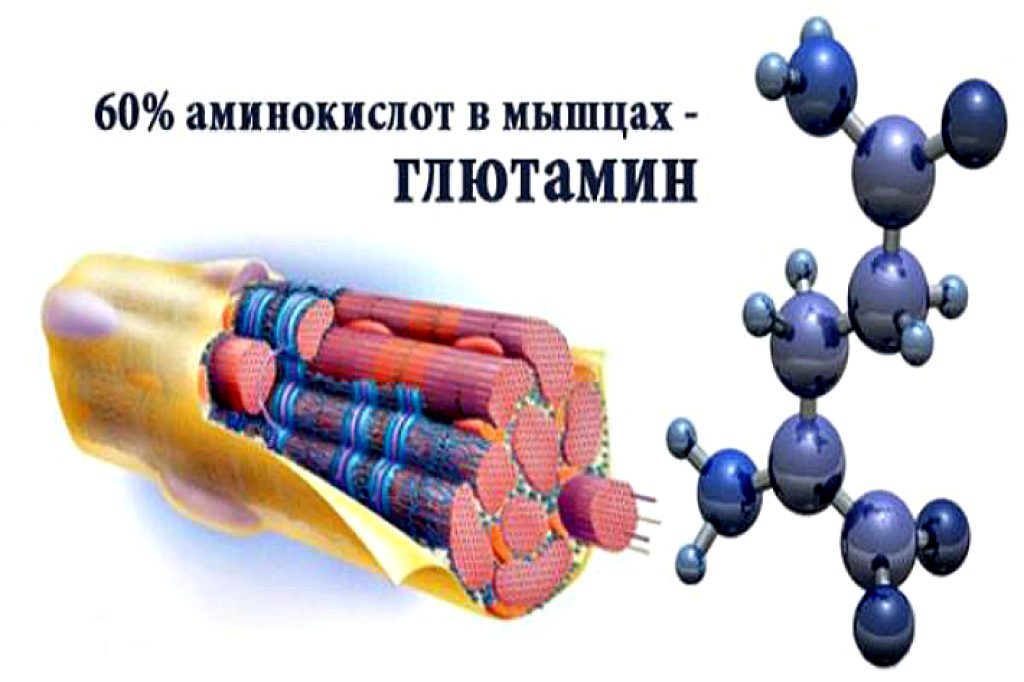
60% of the amino acids inside the muscles is glutamine, it performs so many different functions in the body, so supplementing with it definitely does not hurt.
Glutamine is an essential amino acid that you can buy at the pharmacy, it is part of proteins and is necessary for full muscle growth and immunity. The cost of glutamine is much higher than glycine, but it may be cheaper to buy it in a pharmacy than you can buy it in a sports nutrition store. It is recommended to take glutamine - 5 g 2 times a day.
The action of glutamine
- Is a source of energy.
- It is an anti-catabolic defense.
- Helps strengthen immunity.
- Improves the quality of recovery processes.
- Stimulates muscle growth.
